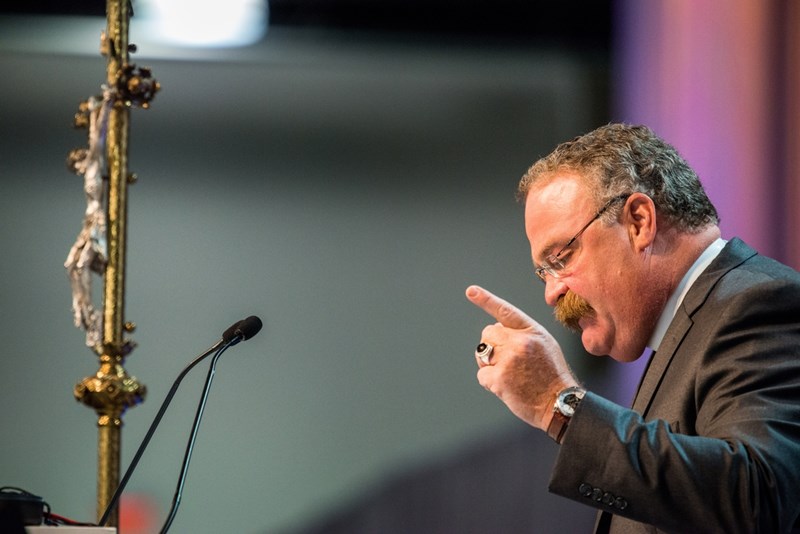Conservatives may be tempted to wonder whether it’s worth fighting. In this soundbite, instant-dislike, tl;dr, flashsnipe, banal, fractious, impressionistic, politicized culture of ours, our instinct can be to retreat, to separate fully, to disengage. I’ve been there, and when I have, I’ve been wrong. So long as we are alive, there is ground to be gained in the battle for truth.
Yesterday’s results from the 2016 Synodical Convention of the Lutheran Church—Missouri Synod are such a gain. In three key resolutions, which passed with remarkable success, delegates to the convention voted to affirm that only pastors may do what only pastors may do; that our daughters should not be forced by our overweening government to play the role of men in combat; and that churches should not confuse people by placing ladies in roles that belong to men in congregational affairs.

It’s easy to see the deck stacked against you in denominational affairs when you are a conservative. Churches in America, where the left-liberal narrative of history (progressivism) and the left-liberal conception of morality (Randian egoism disguised as magnanimous altruism) permeate, seem desperate to ape the dominant American culture. But that false narrative of progress is fundamentally hostile to conservatism, which holds that ancient wisdom and sacred tradition must be preserved and passed on. (The ignorant statement that “Conservatism is wrongheaded: Who wants to conserve the Sixties?!” misunderstands the nature of conservatism.) Those traditions are not good because they are old, but old because they are good: They represent an order and a dignity built into the creation itself, which was pronounced good and was  subsequently fouled up by man’s desire to be what he is not (“as gods”), have knowledge that didn’t belong to him (“good and evil”), and generally achieve enlightenment apart from the Word of God (“and their eyes were opened”).
subsequently fouled up by man’s desire to be what he is not (“as gods”), have knowledge that didn’t belong to him (“good and evil”), and generally achieve enlightenment apart from the Word of God (“and their eyes were opened”).
Adam was tasked with tending a garden, not with creating one.
But even a church body that is delightfully and counterculturally opposed to Darwinian evolution, as the LCMS is, can succumb to the myth of progress, that cancerous outgrowth (or antecedent, depending) of evolution, which inspires in fallen man a duty to transform himself from a hissing gibbon to an angel of light, and his society from a horde of knuckle-dragging misogynistic barbarians to something resembling John Lennon’s “Imagine.” In other words, the myth of progress is drawn from the same hubris that has bedeviled man from the beginning.
All of your ancestors were wrong about everything that matters the most—that is, according to the minds of left-liberals. When your people said that, if you are a man, you should open the door for a lady, they were teaching you to rape and generally abuse and demean her. When they said that it belongs to men to protect women, including through the bearing of arms, they meant to subjugate women and protect their illegitimate and undeserved status in a “patriarchal” society. Grandma never organized her Bridge club into a protest to demand that she be on the Elder Board at church because she was cowed, weak, and oppressed. Or maybe all of them were just woefully ignorant. The poor dears: If they’d only had Oprah and Ellen and Whoopi and Hillary to teach them how to think and act.
For a while, like other denominations, the LCMS tried hard to reject “grandpa’s  church.”
church.”
All of those old people—Chesterton’s “democracy of the dead”—did not confuse being a Christian and naturally wanting others to be Christians with advertising, sloganeering, sales, consultant-imagined programs, statistics, and contemporaneity. They wanted others (unbelievers) who wanted to be what they were (Christians) to be what they were (convert to Christianity). They weren’t selling God or a purpose-driven life. They were trying, however frailly, to imitate their Master. And so they admitted that they didn’t know everything, and that they couldn’t do everything, and that they needed to call someone (a “pastor”) who was spiritually and mentally equipped to do those things that they couldn’t and shouldn’t do (“be the pastor”).
Did the old folks have problems? Absolutely. They had moral failings, they were men and women of their times, and they (like we) will answer to God. But when they failed, when they sinned, they were rebelling against established moral standards—real ones, not imagined ones. They took the old forms for granted—man, woman, marriage, clergy. Their traditions were slow-changing, rooted, imperfectly executed reflections of natural law and the natural order. Incidentally, the Bible they read assumed all of those things—natural law, valid expressions of tradition, forms that are noetically possessed by normal people—as well, because before the modern era everyone everywhere assumed those things.
Today, in American society, there are no forms, or at least no acknowledged forms. Today we have arguments based on pseudoscience, facts that pretend to be objective, as if fallen from the sky and discovered free of human will and context, and a nearly unrestrained hedonism that never lacks for the aforementioned “facts” in order to justify itself. Bruce Jenner is now a woman, because he feels that way, and look—here are some studies to show you that there is a thing called “transgenderism.” Or are you a bigot?
By rejecting “lay pastors,” the conscription of women, and female communion  assistants and “elders,” the Missouri Synod didn’t just bear witness to particular points of doctrine or to the truths contained in certain Bible verses (worthy though those actions are). The LCMS officially embraced a conservative ethos.
assistants and “elders,” the Missouri Synod didn’t just bear witness to particular points of doctrine or to the truths contained in certain Bible verses (worthy though those actions are). The LCMS officially embraced a conservative ethos.
Now the real work continues. The LCMS must articulate these truths and that approach to Truth clearly, winsomely, and uncompromisingly—to other church bodies, to a snarky, skeptical media, and most importantly, to itself. I am confident that the Rev. President Matthew Harrison, again reelected, will continue this work. But for tradition to be traditioned, the entire church—pastors and laity—must work and walk together.
Leave a Reply